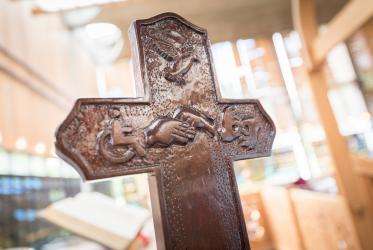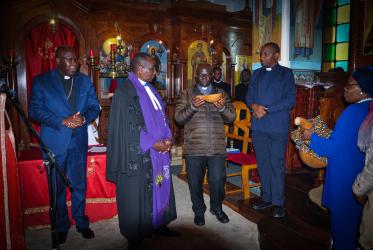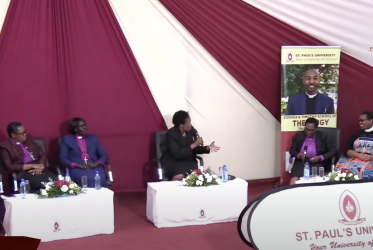Supported by the World Council of Churches' Ecumenical Disability Advocates Network (EDAN), people with disabilities are welcomed at the Bio Intensive Agricultural Training Centre run by the Methodist Church of Kenya (MCK). People with disabilities learn livelihood skills with other members of the community at the Centre, contributing towards local development.
The Center based in Meru, in the eastern part of Kenya, is spread over two acres of land and teaches local farmers modern methods of farming on small pieces of land.
Since January 2015, the Centre acting upon the initiative of EDAN opened its doors to people with disabilities, engaging especially those coming from lower economic strata of society.
The project is carried out in collaboration with the Anglican Development Services and the United Disabled Persons of Kenya, and with support from the Finnish Evangelical Lutheran Mission through EDAN.
“In the organic system of farming at the Centre, people with disabilities learn skills related to animal rearing, fish farming and plantation,” says Alice Munala, programme coordinator for disability at the MCK.
Munala says that despite disabilities, people are able to own green houses with help from the Centre. With access to some capital, they get a chance to become economically independent.
The initiative resonates with the United Nation Convention on the Rights of Persons with Disabilities, and with the vision of the Sustainable Development Goals (SDGs) related to disability.
The Kenyan state ratified the Convention in May 2008, among the early nations to do so. The Convention had been ratified by 157 states by the end of August 2015.
“Being part of the SDGs process, EDAN is focussing on realizing SDG goals for the inclusion of people with disabilities in development,” said Dr Samuel Kabue, coordinator of EDAN. Disability is referenced in various parts of the SDGs and specifically in parts related to education, growth and employment, inequality, accessibility of human settlements, as well as data collection and monitoring of the SDGs.
“For too long, people with disability have been excluded from the development efforts,” added Kabue, coordinator of EDAN. The mention of people with disabilities in the new International Development Framework, Kabue believes, is “one way to strengthen disability-inclusive development practices and thus help people with disabilities to be self-sufficient.”
“Recognizing the rights of people with disability is an important step in the long journey for a truly disability-inclusive society. Disability-inclusive development envisions a society that values and enfranchises all people with disabilities. Disability-inclusive practices seek to contribute towards equality of opportunity and equitable outcomes from all people around the world,” added Kabue.
Frasia K. Nyota, a local school teacher in Meru and a person with a disability, was able to benefit from facilities offered by the Centre. “The Centre has helped many people like myself to become economically independent. We have received some capital which we used to buy cattle,” shares Nyota.
She said her income made it possible for her to help children with disabilities at the school where she works. “It gives me great joy to take care of children and assist them in every way possible,” says Nyota.
Martin Gikunda Kirigia, coordinator for urban and rural development at the MCK, says that professional skills offered by the Centre meet the needs of people with disabilities. “People who are in wheelchairs can grow vegetables in green houses, and can work at the honey processing unit.”
“Participating in such activities makes them contributing members of the community,” says Kirigia.
EDAN will continue to conduct projects aimed at improving the livelihoods of persons with disabilities in East Africa. Participants fulfill their roles as citizens by collaborating with churches, non-governmental organizations and civil society actors through inclusion in development. Such initiatives are implemented in Kenya, Uganda and Tanzania.
A recent meeting held in Meru, from 24 to 25 October, strengthened the work of EDAN and its partners in supporting people with disabilities throughout the region. The discussions centred on sensitizing the community about the issues of disability, and these conversations involved church leaders, local activists as well as persons with disability themselves.
Theological reflections promoting the concept of an “inclusive church” and a “disability friendly church” were shared at a special service held on Sunday at the MCK Kianjai Church.
Bishop Samuel Kathawe of the MCK Miathene Synod, preaching at the service, stressed that “churches must be disability-friendly”. In his reflections, he denounced theology which perpetrates disability as a punishment from God and a result of sin. “Disability is not an inability, and a church must become inclusive of all its members while being sensitive to their special needs,” he added.
Established in 1998, EDAN in collaboration with churches and partner organizations addresses issues affecting persons with disabilities, through advocacy for inclusion, participation and active involvement of persons with disabilities in the spiritual, social and developmental life of church and society.
Download high resolution photos via Photos Oikoumene
EDAN pushes for Kenya’s implementation of Disabilities Rights Convention (WCC news release of 24 August 2015)
More information about the Methodist Church of Kenya






